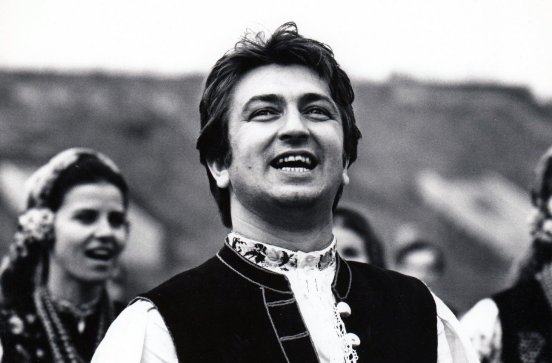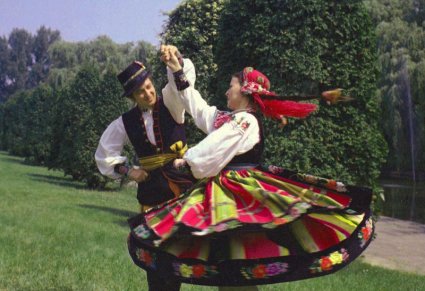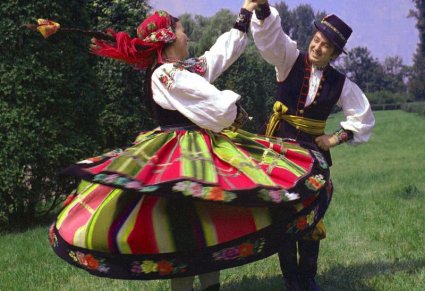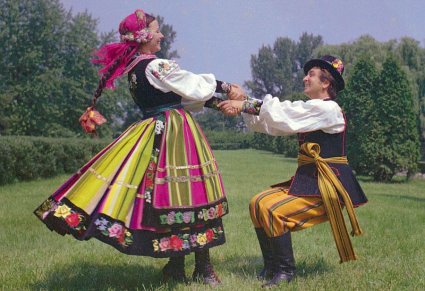
The Stanisław Jopek International Singing Competition
Under the honorary patronage of the Ministry of Culture and National Heritage, the Minister of Foreign Affairs, Radosław Sikorski, and the Marshal of the Mazowieckie Voivodeship, Adam Struzik.
Co-financed by funds from the Mazowieckie Voivodeship and the Minister of Culture and National Heritage.
Under the honorary patronage of the Ministry of Culture and National Heritage, the Minister of Foreign Affairs, Radosław Sikorski, and the Marshal of the Mazowieckie Voivodeship, Adam Struzik.
Co-financed by funds from the Mazowieckie Voivodeship and the Minister of Culture and National Heritage.

Stanisław Jopek
Stanisław Jopek was Mazowsze’s Ensemble’s most well-known soloist, famous for his remarkable voice. Originally from Lviv, he often described himself as lucky to be part of Mazowsze, and the Ensemble itself as the best music academy and school of life.
Early Years
Jopek was born in 1935 in Lviv, a city well-known for its interwar music scene, to a family of keen singers. After the war, the family was repatriated to Kościerzyce, in south-western Poland. “I think smiling is in my genes”, related Jopek during an interview for Dziennik Zachodni in February 2003. “I was born and raised in Lwów – such a joyful city – and I was a very happy lad from Lwów. In Mazowsze, I was reminded about smiling every day. Folklore is full of joy, and you can’t sing or dance without it. I think it is in me, and it is my whole life”. Jopek was well-known for the exceptional timbre of his voice: a tenor with baritone hues. His talent was complemented by an innate charisma, and he delighted audiences around the world both with his vocal ability and his extraordinary stage presence.
The Song which Changed his Life
After his family’s repatriation, Jopek began studying both at the trade school and the music school in Brzeg, south-western Poland. The director of the music school, Eugenia Kryńska, recognised his talent and encouraged him to audition for the Skolimów Song and Dance Company. His audition in 1952 was a success. During his time with the company, he received a musical education and began to dream of a career as an opera singer. His teachers included Jerzy Sergiusz Adamczewski, Feliks Rudomski, Jan Trybus and Zofia Breg. He was noticed by Mira Zimińska-Sygietyńska at a concert but her suggestion that he join Mazowsze was not initially received with much enthusiasm: Jopek’s preference was for classical music. His mind was changed, however, after he witnessed a performance of Mazowsze’s choir (most probably singing “Cyt, cyt”). “I was delighted not only by their sound but also by the clarity of each word”, he explained later.
Stanisław Jopek joined Mazowsze as a singer-soloist in 1956. From that time, he performed with the group at every concert. He sung in 36 languages – performing well-known traditional songs from all around the world, and his repertoire included operatic arias, the songs of Chopin and Moniuszko and Polish Christmas carols.
Although he had the opportunity to move to Canada, where his parents lived, with the start of martial law, he chose to remain in Poland.
Stanisław Jopek joined Mazowsze as a singer-soloist in 1956. From that time, he performed with the group at every concert. He sung in 36 languages – performing well-known traditional songs from all around the world, and his repertoire included operatic arias, the songs of Chopin and Moniuszko and Polish Christmas carols.
Although he had the opportunity to move to Canada, where his parents lived, with the start of martial law, he chose to remain in Poland.
Photo Gallery
1/3
His Signature Song
Stanisław Jopek first performed what would become his most famous song – “Furman”, or “The Cart-driver” – during a performance in London a few weeks after joining the Ensemble. “I thought I might be singing it for a year, maybe two, but it turns out I’ve been singing it ever since. No matter where I am, audiences want to hear it, which is amazing as I have over fifty songs in my repertoire, and some of them are fantastic”, he explained.
“Furman” brought Jopek fame at home and abroad. The melody – which Sygietyński adapted from the work of eminent Polish ethnographer, Oskar Kolberg – is paired with eleven verses of strong satire. Jopek was concerned that it might attract the attention of censors and generally limited his performances to the first three verses, bravely moving beyond these only when encored. He always said the song reminded him of his childhood, when his father refused to allow him to drive his cart without supervision.
Throughout his years at Mazowsze, “Furman” remained one of the Ensemble’s most popular and recognisable hits, and it became Stanisław Jopek’s signature song for half a century.
“Furman” brought Jopek fame at home and abroad. The melody – which Sygietyński adapted from the work of eminent Polish ethnographer, Oskar Kolberg – is paired with eleven verses of strong satire. Jopek was concerned that it might attract the attention of censors and generally limited his performances to the first three verses, bravely moving beyond these only when encored. He always said the song reminded him of his childhood, when his father refused to allow him to drive his cart without supervision.
Throughout his years at Mazowsze, “Furman” remained one of the Ensemble’s most popular and recognisable hits, and it became Stanisław Jopek’s signature song for half a century.
Around the World with Mazowsze
As part of Mazowsze Ensemble, Jopek visited over 100 countries around the world, including China, Japan, Argentina, Egypt, France and Great Britain. In New York, he met Artur Rubinstein, Jan Kiepura and Marta Eggerth, and was invited to audition for the Metropolitan Opera. He befriended the French actor, Robert Hossein, and recalled that in Paris he was offered a job by the director of the Moulin Rouge.
The Important Women in his Life
Stanisław Jopek met his wife, Maria Stankiewicz, in Mazowsze. Their daughters are renowned Polish vocalist, Anna Maria Jopek, and violinist Patricia Jopek. Mazowsze’s director, Mira Zimińska-Sygietyńska, remained a highly influential presence in his life. He emphasised that she taught him how to respect his audiences and how to approach his art with modesty. “No matter where you are, sing as though God has given you one final opportunity to sing; as though you are singing for the last time. This was my belief”, he explained.
A Decorated Artist
Stanisław Jopek received numerous awards for his work, including Poland’s highest honours for the promotion of Polish culture at home and abroad.
He also achieved that which an artist ultimately aspires to: performing on the world’s greatest stages and winning the hearts of audiences across the globe. His talent transcended language barriers and cultural differences and he will be remembered as someone who was able to inspire wonder and recognition among communities worldwide.
Stanisław Jopek died on 1 August 2006 and is buried at the Powązki Cemetary in Warsaw.
He also achieved that which an artist ultimately aspires to: performing on the world’s greatest stages and winning the hearts of audiences across the globe. His talent transcended language barriers and cultural differences and he will be remembered as someone who was able to inspire wonder and recognition among communities worldwide.
Stanisław Jopek died on 1 August 2006 and is buried at the Powązki Cemetary in Warsaw.






